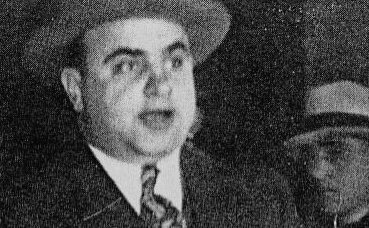
Direct examination by Jacob Grossman:
Grossman: Who were the managers of the place?
Shumway: Mr. Penovich and Mr. Pope.
Grossman: And just what kind of a place was that gambling establishment, what did they have there? Shumway: Well, they had the horses, and all kinds of gambling games, a wheel, craps, “21”, bird cage.
Grossman: Was it a pretty complete gambling establishment?
Shumway: Why, yes, it, I should say so.
Grossman: What were your duties at that place?
Shumway: I was figuring sheets.
Grossman: Sheets on what?
Shumway: The horses.
Fink: You were what?
Grossman: He figured the sheets on horses.
Shumway: Figured the sheets on the bets.
Grossman: Well, did you do anything other than figure sheets before you became a cashier?
Shumway: Yes, sir, I used to help Mr. Penovich figure up.
Grossman: Figure?
Shumway: Figure up the day's business.
Grossman: Tell us what that consisted of.
Shumway: Well, that was held on one sheet....
[Grossman picks up the 34-page ledger discovered by agent Frank Wilson and asks a series of questions about the entries on a number of pages.]
Grossman: I notice at the top left hand corner of each page, for instance, on page 12, “bank,” $12,000.” What does that mean?
Shumway: That was the bank roll that we started with.
Grossman: Started at the beginning of the month?
Shumway: Yes, sir.
Grossman: In other words that was the capital of the business?
Shumway: Yes, sir.
Grossman: Now you stated a little while ago that Mr. Pope and Mr. Penovich were the managers? Shumway: Yes, sir.
Grossman: They were sort of bosses right over you?
Shumway: Yes, sir.
Grossman: Who was the boss over them?
Fink: If there was one.
Grossman: If there was one.
Fink: And he knows. That is really a conclusion, if Your Honor please.
Judge: It may or may not be. It may be a fact if he knows.
Fink: My point is this: There may have been things done and said from which he would draw one conclusion and Your Honor would draw another.
Judge: You have the right to cross-examine him on that. I say that is a fact as the question is put.
Judge (to witness): Do you know who the owner of the place was?
Shumway: Not definitely...Well, from hearsay, or what I was told.
[The Court sustains the defense objection.]
Grossman: Now, did you at any time see the defendant, Alphonse Capone, in that establishment? Shumway: Yes, sir, I have seen him in there.
Grossman: Where did you see him?
Shumway: Well, it would be in the office, because I would never be anywhere else.
Grossman: Did you see Al make any bets in that establishment on horses?
Shumway: No., sir.
Grossman: Do you know whether he ever made any bets there?
Shumway: Well, he has made some over the wire, but he didn't make any in the establishment.
Grossman: Did you ever see Al Capone's name on the wire record as having made bets over the wire?
Shumway: Yes, sir.
Grossman: Now, where did the place move from, how many did you operate in, do you remember? Shumway: Yes, I say five or six. I don't know.
Grossman: Right in the immediate neighborhood there, is right?
Shumway: Yes, all around within a couple of blocks.
Grossman: Well, where was the money kept?
Shumway: The money was kept in a big safe in a nearby vacant building....
Grossman: Was there any question about it?
Shumway: Yes, I had a conversation with Frankie Pope.
Grossman: All right, tell us what it was?
Shumway: I told Frankie I didn't like the idea of going down there with the guard because if anything happened, why I would be the henchman that was right in the middle. And I asked him to get someone else to take it down.
Grossman: And then what happened?
Shumway: Well, he said, “Oh it is all right, then go ahead without the guards.”
Grossman: Did you any time after that have any conversation with Al Capone about carrying money over there?
Shumway: It was some time later that Al asked me what I would do if I got stuck up, and I told him, I says, “I would just let them take it,” and he says, “That is right.”
Grossman: He said, “That is right"?
Shumway: Yes, sir....
